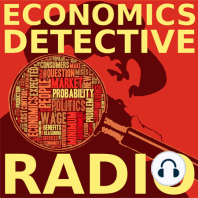46 min listen

Medicine, Entrepreneurship, and Health Policy with Ray March
Medicine, Entrepreneurship, and Health Policy with Ray March
ratings:
Length:
48 minutes
Released:
Jan 14, 2017
Format:
Podcast episode
Description
What follows is an edited transcript of my discussion with Ray March about the economics of medicine and health insurance. We had a fascinating and far-reaching discussion about health care policy, both in the United States and Canada, as well as some cases of entrepreneurship in the medical sector. This includes a slightly awkward discussion of the development of sexual pharmacology, the early experiments with nitrates and Viagra, and the, uhhh, "firmness" those drugs produce. Enjoy! Petersen: My guest today is Ray March of Texas Tech University. Ray, welcome to Economics Detective Radio. March: Thanks for having me. Petersen: So our topic today is the economics of medicine. Ray's research concerns entrepreneurship and regulation in medicine. Let's start by talking about this idea of entrepreneurship in medicine. The medical field isn't like Silicon Valley. You can't just launch a pharmaceutical company out of your parents' garage. In fact, the whole field is tightly regulated and controlled by the government both in the United States and Canada, other countries. So how do people in the medical field still manage to be entrepreneurial? March: Entrepreneurship is fundamentally a question about how do I find resources I have now and put them towards their best use and that will help me turn a profit and therefore we have market signals. You're right to point out medicine is a much more regulated area compared to other service industries but what makes medicine entrepreneurial is that there's always a void to discover, there's always a need to find better uses and better cures or better ways to treat patients. And because the government is usually behind the curve in terms of the advancement of science---and this is particularly true in health science and medicine---there's always opportunities for entrepreneurship. And a lot of my research explains or tries to explore what are these areas of medicine or of health just more broadly that the government is not involved in because they're not necessarily aware that this is an emerging field. And that leaves room for scientists and more broadly entrepreneurs to come and fill in gaps. Petersen: Okay. So, when you say the government is behind the curve, a big part of that is the Food and Drug Administration, the FDA, in the United States. And of course it has its equivalent in other countries as well. So, tell me a little bit about the FDA. So, if I discovered a new drug, what kind of process would it take for me to bring it to market in the United States? March: If you want to go through the FDA procedure usually takes between 12 and 20 years and somewhere around a billion dollars of investment. You bring it to the FDA, you go through initial screening which is "Is the drug effective?" "Can it actually do what you purport it can do?" That's phase one. Phase two is a little bit larger clinical trial so instead of 30 people you go through 1,000 people. And you have to report that it's also effective. Then you get into safety which is what the FDA was originally intended to do was to eliminate the worry that they were going to be unsafe drugs on the market. Then you have to go through a clinical trial about typically 3,000 people to show that it doesn't hurt them. Beyond that, you've got phase four which is approval, you get your drug approved and even the drug is approved, you are not quite off the hook. Yet you still have to have post surveillance. And post surveillance is, it's approved but if we find any problem outside on the market or we find that we didn't pick up with something in our very detailed clinical study, we find there is some kind of problem, then we can remove the drug and that typically lasts 14 to 16 years. Petersen: Okay, so it's an extremely long process. Long and costly and we hear sort of horror stories about before there was an FDA---before there was regulation of medicine---you'd have people sell snake oil or tonics, miracle cures that really just made people
Released:
Jan 14, 2017
Format:
Podcast episode
Titles in the series (100)
Gold and the Great Depression with James Caton: In this episode, James Caton discusses the classical and inter-war gold standards. James is an economics PhD student at George Mason University. Gold has many qualities that make it an ideal money: It is valuable, scarce, divisible, and easy to... by Economics Detective Radio